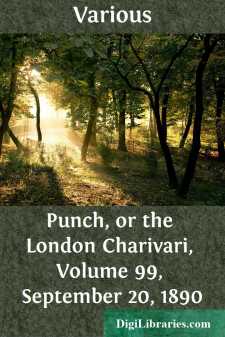Categories
- Antiques & Collectibles 13
- Architecture 36
- Art 48
- Bibles 22
- Biography & Autobiography 813
- Body, Mind & Spirit 142
- Business & Economics 28
- Children's Books 15
- Children's Fiction 12
- Computers 4
- Cooking 94
- Crafts & Hobbies 4
- Drama 346
- Education 46
- Family & Relationships 57
- Fiction 11828
- Games 19
- Gardening 17
- Health & Fitness 34
- History 1377
- House & Home 1
- Humor 147
- Juvenile Fiction 1873
- Juvenile Nonfiction 202
- Language Arts & Disciplines 88
- Law 16
- Literary Collections 686
- Literary Criticism 179
- Mathematics 13
- Medical 41
- Music 40
- Nature 179
- Non-Classifiable 1768
- Performing Arts 7
- Periodicals 1453
- Philosophy 64
- Photography 2
- Poetry 896
- Political Science 203
- Psychology 42
- Reference 154
- Religion 513
- Science 126
- Self-Help 84
- Social Science 81
- Sports & Recreation 34
- Study Aids 3
- Technology & Engineering 59
- Transportation 23
- Travel 463
- True Crime 29
Punch, or the London Charivari, Volume 99, September 20, 1890
by: Various
Categories:
Description:
Excerpt
OUT FOR ANOTHER HOLIDAY.
(By our Impartial and Not-to-be-biassed Critic.)
I had been told that Ostend was an excellent place. "Quite a Town of Palaces!" was the enthusiastic description that had reached me. So I determined to leave "Delicious Dover" (as the holiday Leader-writer in the daily papers would call it), and take boat for the Belgian coast. The sea was as calm as a lake, and the sun lazily touched up the noses of those who slumbered on the beach. There is an excellent service of steamers between England and Belgium. This service has but one drawback—a slight one: the vessels have a way with them of perpetrating practical jokes. Only a week or so ago one lively mail-carrier started prematurely, smashing a gangway, and dropping a portmanteau quietly into the ocean. On my return from foreign shores, I passed the same cheerful ship lying in mid-channel as helpless as an infant. However, the accident (something, I fancy, had gone wrong with the engines) appeared to be treated as more amusing than important. Still, perhaps, it would be better were the name of this luckless boat changed to Le Farceur; then travellers would know what to expect. But I must confess that my experiences were perfectly pleasant. The steamer in which I journeyed crossed the Channel in the advertised time, and if I wished to be hypercritical, I would merely hint that the official tariff of the refreshments sold on board is tantalising. When I wanted cutlets, I was told they were "off," and when I asked for "cold rosbif," that was "off" too. The garçon (who looked more like a midshipman than a cabin-boy) took ten minutes to discover this fact. And as I had to rely upon him for information, I had to wait even longer before the desired (or rather undesired) intelligence was conveyed to me. I pride myself upon caring nothing about food, but this failure to obtain my heart's (or thereabouts') yearning caused me sore annoyance.
Well, I reached Ostend. The town of palaces contained a Kursaal and a Casino. There were also a number of large hotels of the King's Road, Brighton, plus Northumberland Avenue type. Further, there were several maisons meublées let out in flats, and (to judge from the prices demanded and obtained for them) to flats. The suite of apartments on the ground floor consisted of a small bed-room, a tiny drawing-room, and a balcony. The balcony was used, as a salle ÐÑ manger in fine weather, and a place for the utterance of strong expressions (so I was informed) when the rain interfered with al fresco comfort. There was a steam tramway, and some bathing-machines of the springless throw-you-down-when-you-least-expect-it sort. The streets, omitting the walk in front of the sea, were narrow, and the shops about as interesting as those at the poorer end of the Tottenham Court Road. But these were merely details, the pride of Ostend being the Kursaal, which reminded me of an engine-house near a London terminus. I purchased a ticket for the Kursaal and the Casino. There was to be a concert at the first and a ball at the last....












